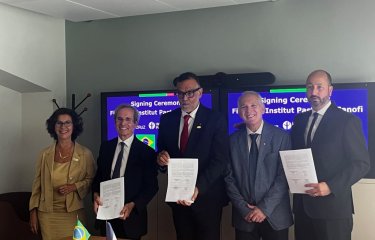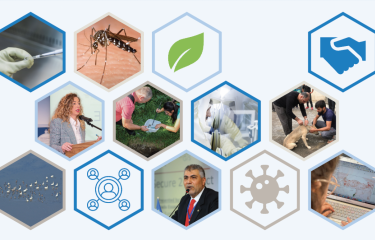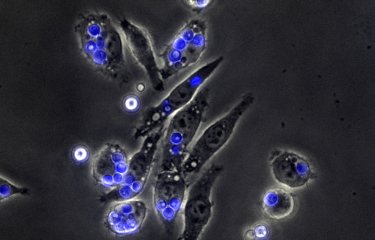The 7th ceremony in honour of the young graduates who completed their science thesis at the Institut Pasteur during the 2018-2019 academic year was held on 13 December 2019. Since 2013, this ceremony has highlighted the excellence of the international scientific community at the Institut Pasteur. This year, four young researchers from the Institut Pasteur International Network were present among the young Pasteurian scientists.
Introduced by Olivier Schwartz, Scientific Director of the Institut Pasteur, the ceremony began with an exceptional conference by the 2014 Nobel Prize in Chemistry, Professor Stefan W. Hell. Pierre-Marie Girard, Institut Pasteur's Vice-President International Affairs, introduced the graduates of the Institut Pasteur International Network with Monica Sala, Director of Education at the Institut Pasteur.
Anabelle PERRIER
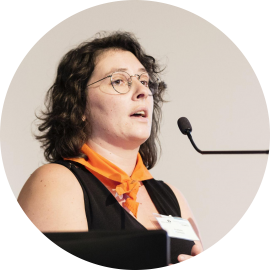
Molecular and Cellular Virology Laboratory, Center for Infection and Immunity of Lille (CIIL), Institut Pasteur de Lille, Université de Lille.
Intracellular trafficking of the M protein of Middle East Respiratory Syndrome Coronavirus (MERS-CoV)
MERS-CoV is a highly pathogenic coronavirus that emerged in Saudi Arabia in 2012 and is, until now, responsible for an epidemic of severe pneumonia. It is the second coronavirus that emerged during this decade after SARS-CoV in 2003 in China.During her thesis work, Anabelle Perrier was interested in understanding the assembly steps of the Middle East respiratory syndrome coronavirus (MERS-CoV) proteins and, more specifically, the pathway followed by these proteins in the cell, from their production to their assembly.
The work conducted by Anabelle identified on one of the MERS-CoV proteins, the membrane protein M, a signal sequence involved in its targeting to a specific compartment of the cell which is the trans-Golgi network. The identification of this signal is crucial for a better understanding of the assembly step and more generally the viral cycle of coronaviruses.
Anabelle Perrier is currently looking for an opportunity to pursue her career in research and development in the pharmaceutical and biotechnology industries.
Régine KIASUWA MBENGI
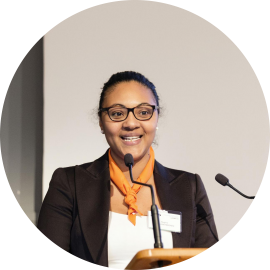
Cancer Center, Sciensano
Université Libre de Bruxelles
The Evolution of the Socio-Economic Position After Cancer of Belgian Workers. Measure and Determinants
Regine Kiasuwa Mbengi graduated in 2008 in the Humanities and Political Sciences, followed her training at the School of Public Health of the Free University of Brussels (ULB) with a Master's degree in Health Systems and Management to then pursue a PhD in Public Health of this same university. She did her thesis work at the Sciensano Cancer Center on European joint action projects on the fight against cancer. It has thus linked various databases of the Belgian system in order to follow the evolution of the socio-economic position of Belgian workers who had cancer. Two literature reviews and three cohort studies yielded unique results that provide insights into the problem, quantify the phenomenon, and suggest ways for the government to improve the system.
Régine Kiasuwa Mbengi is in charge, at the Cancer Center, of subjects related to the professional reintegration of cancer patients-patients and continues her work in this way.
Irini PAPAZIAN
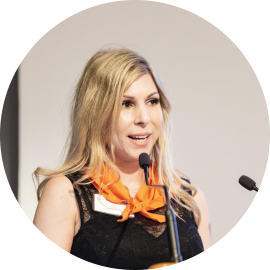
Molecular Genetics lab, Hellenic Pasteur Institute, Greece
Study of the roles of soluble and transmembrane TNF in CNS
Irini Papazian completed her PhD in the Molecular Genetics Laboratory at the Hellenic Pasteur Institute. Although Tumor Necrosis Factor (TNF) inhibitors are successful drugs for chronic peripheral immune diseases, such as rheumatoid arthritis, they worsen the condition of patients with multiple sclerosis and can even lead to multiple sclerosis in some patients treated with these molecules. During her thesis, Irini Papazian investigated whether TNF neuroprotection blockade could be a reason for the adverse effects of these non-selective TNF inhibitors in the development of multiple sclerosis. Her work has highlighted the neurotoxic effects of a TNF receptor, TNFR1, in the development of the disease. These data reinforce the idea that selective inhibition of TNFR1 may be a therapeutic approach against inflammatory CNS diseases such as multiple sclerosis. Currently, Irini Papazian continues to work on research projects on the interface between the immune system and the central nervous system (CNS) in inflammatory diseases such as multiple sclerosis in the Molecular Genetics Laboratory of the Hellenic Pasteur Institute.
Her work has been co-funded by the Multiple Sclerosis Trials Collaboration (MSTC), UK and competitive calls for projects from the General Secretariat of Science and Technology of the Hellenic Ministry of Development and Investment.
Adelina STOYANOVA

Department of Virology, Stephan Angeloff Institute of Microbiology
Consecutive alternating treatment scheme against Coxsackievirus B infections
The emergence of drug-resistant enterovirus strains makes current treatments less effective. During her thesis, Adelina Stoyanova researched a new scheme for the in vivo application of triple combinations of anti-enteroviral drugs with different modes of action against Coxsackievirus B infections. Adelina thus identified, in a model a new approach consisting of consecutive consecutive administration (CAA) which decreases the mortality rate, increases the survival time and protection of infected mice, prevents the development of drug resistance and provides activity significant antiviral. Adelina Staoyanova is a researcher in the Department of Virology at the Stephan Angeloff Institute of Microbiology. She continues her work on the development of different CAA combinations and the clarification of the genotypic and phenotypic characteristics of viral progeny obtained after treatment.
The work of this thesis was funded by the Bulgarian National Fund for Science and Funding Program of the Bulgarian Academy of Sciences for Young Scientists.



